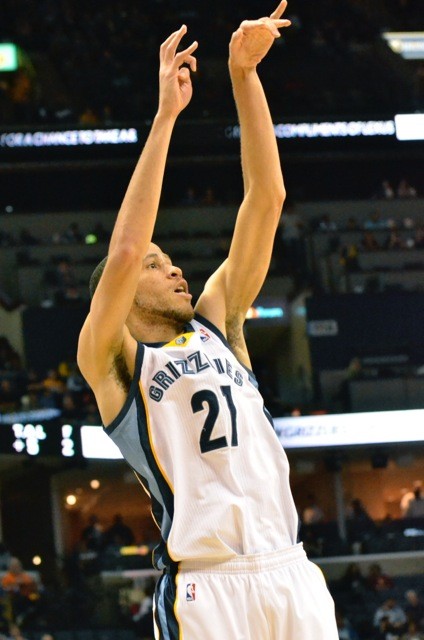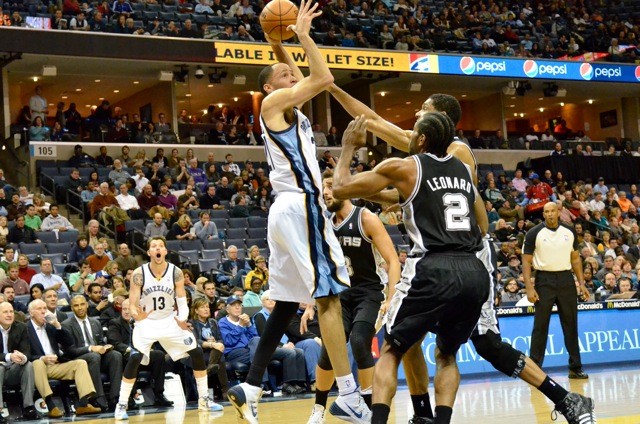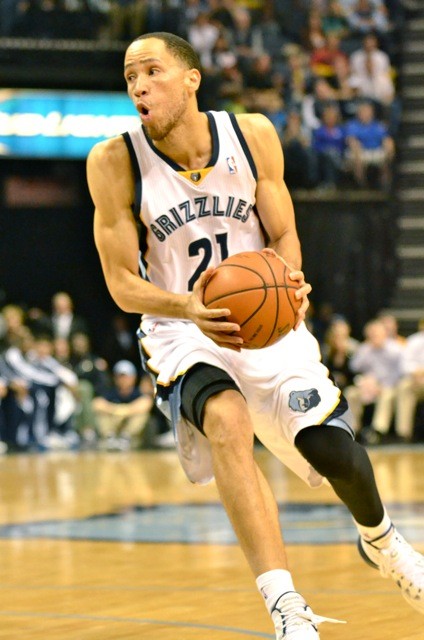 Larry Kuzniewski
Larry Kuzniewski
When in the course of human events it becomes necessary for one team to dissolve the contractual (emotional?) bonds which have connected them with a player, and to assume among the powers of the earth, the separate and equal station to which the Laws of the Collective Bargaining Agreement and of the Collective Bargaining Agreement’s Commissioner entitle them, and trade somebody to another team so, y’know, title runs and stuff, a decent respect to the opinions of mankind requires that they should declare some things about the player(s) who are outgoing, especially when said player has been a bit of a muse/white whale around these parts for a while now.
Tayshaun Prince did not ask to be a Memphis Grizzly. He was in Detroit for the first 10½ seasons of his career, and it appeared, even as Joe Dumars imploded (first intentionally and then accidentally) the franchise around him, that he was content to stay there forever—a fixture there, a legend, The Last Guy from the 2004 title team, the last connection to the Sheed Pistons. Gold medalist, etc. Prince seemed to be totally content to stay in his lane—driving the guys over at Detroit Bad Boys crazy with his “Isotayshauns”—and do his thing in Detroit.
But the Pistons had other ideas, and when the Rudy Gay trade went down—Gay to Toronto for Ed Davis and Jose Calderon, who was then traded to Detroit for Tayshaun Prince and Austin Daye[1]—Tayshaun found himself in Memphis, on a team headed for a deep playoff run in need of a small forward who wouldn’t have a 30% usage rate and who could handle the ball and pass instead of contributing to what I used to not-quite-affectionately refer to as the Lionel Hollins Clogged Toilet Effect.[2]
Prince filled that role, and filled it well, facilitating instead of shooting and scoring, not trying to take over the game the way Gay did, and (most importantly) not making anywhere near as much money as Gay did—which was always the real reason Gay had to be dealt. At the time, of course, the Grizzlies were offered Jeff Green for Gay straight up and turned it down, which is especially ironic now that Prince and a first are headed to Boston for Green. But that’s not really the point of what we’re doing here: let’s talk about Tayshaun.
He never shot as well as anyone expected him to, and to be honest, the bar was pretty low. But the Grizzlies asked Prince, a career postup guy, to try to space the floor—to stop taking 19-footers and step back into 3-pointers, essentially—and (1) it was and is probably far too late into Prince’s basketball career for him to change the way he plays to that extent[3] and (2) even if that weren’t the case, it didn’t really ever work out. Ultimately it was that that doomed him to be traded again—he was making the shots, sure, but he still wasn’t taking or making enough of them to justify keeping him over a guy like Jeff Green, who—even if his percentages aren’t great—is at least a little bit better offensive player. That much is hard to argue with.
 Larry Kuzniewski
Larry Kuzniewski
I’m sure I’ve said it pretty often, but I’ve always been a fan of Tayshaun Prince. Watching his slow decline into “veteran locker room presence” was tough, and illustrative of the way NBA careers usually end: not with a bang, but with a whimper. These guys aren’t around forever, and their gifts always leave them before they expect them to. I’m not sure Prince is completely done for as an NBA player—he’s still an above-average defender, and could be useful on a team like the Clippers (or, most poetically, the Pistons) who need a wing defender on the cheap to make a playoff run. But there’s no denying that he’s not the player he used to be. In hindsight, I don’t think the Grizzlies made a mistake in trading for him. The run to the Western Conference Finals was in part made possible by Prince, who had a great playoffs until he got injured during the Oklahoma City series that year. But he and Tony Allen together couldn’t get it done against the Spurs (in the playoffs and, really, ever again as long as they were both on the Grizzlies). It’s tough to say.
 Larry Kuzniewski
Larry Kuzniewski
But, at any rate, I’m glad we got to watch Tayshaun Prince. I like the guy. I’m not necessarily going to miss his line-drive jumpshots hitting off the back iron, but it’s hard to completely remove the “fan” in me from this equation, and I’m a fan of his. Whether or not the Prince Era in Memphis was really the right move in getting rid of Rudy Gay (and I still think it was), it brought the Grizzlies farther than they’d ever been before, and Prince’s role in that wasn’t conincidental. This is a guy who was a starter on that team. That’s history. That’s Grizzlies history, and the Grizzlies don’t have a whole lot of history that isn’t jokes about currency exchange, Pau Gasol trades, and Big Country getting fat. Whether or not the Jeff Green trade pushes the Grizzlies over the hump to an NBA title[4]—it might, it might not; the West is so wide open we won’t know it’s going to happen until it’s already happened—sometimes it’s nice to stop and say, “this is history. This has happened.” And sometimes things have to change before we reflect on them; that’s human nature. So, just know this: we are all now watching a different team. The Tayshaun Prince Era of the Memphis Grizzlies is over, to the extent that it was ever “his” era to begin with.
-
That is, NBA World Champion Austin Daye because Spurs. ↩
-
If I were to start writing that joke today, I’d probably say “turlet” instead of “toilet,” because that’s just so much funnier. ↩
-
I had a surprisingly candid conversation about this with Prince at Media Day before the season started. He was talking about how at Kentucky, he was primarily a scorer, but when he got to the Pistons, they had scorers. They didn’t need him to be a scorer—he needed to be a faclilator, a defender, a glue guy. He said he played that way for so long that even after the Pistons did need him to be a scorer, he couldn’t really change the way he played. The same thing, he said, applied to the Grizzlies: they needed him to space the floor, and it just wasn’t really how his brain processed the game. It was a big adjustment for him, one he never fully made. ↩
-
I, for one, welcome our new Jeff Green overlords. ↩